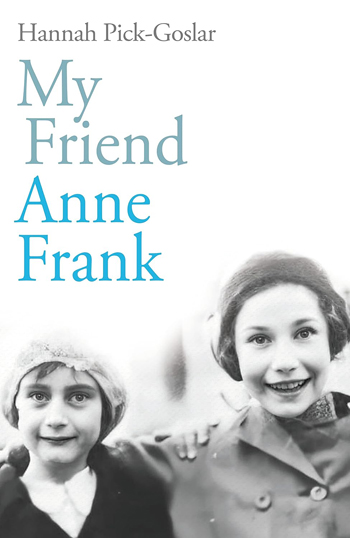By Charles Gardner — 
Amsterdam was the wartime setting for great heartache and injustice, freshly depicted in a new autobiography of a Holocaust survivor who only recently died, aged 93.
Hannah Pick-Goslar, a childhood friend of the legendary Anne Frank, tells how, as a five-year-old German Jewish refugee, she moved with her parents to Amsterdam to start a new life after the Nazis came to power under Hitler.
She became best friends with Anne, also a refugee from Germany, and paints a happy, carefree picture of her early childhood in neutral Holland before the Nazi occupation imposed increasingly severe restrictions on the liberty of the Jewish community there.
One day she knocked on Anne’s door, only to discover that the family had suddenly disappeared. They had gone into hiding, but she assumed they had fled to relatives in Switzerland.
It was many years before she learned they had hidden in Amsterdam for two years before being betrayed, arrested, and sent to concentration camps.
It was the extraordinary diary Anne kept while in hiding that eventually made her the famous writer she always wanted to be, only never to see her published work, which came about thanks to her father Otto, the family’s lone survivor.
Hannah’s family, meanwhile, along with so many others, were later deported – first to the holding camp of Westerbork and then to Bergen-Belsen where they endured a long nightmare of humiliating cruelty and suffering – treated worse than animals.
As if it was not enough that her mother died in childbirth before their deportation, she watched helplessly as first her beloved father, then her Opa and Oma (grandparents) succumbed to the disease and starvation that ended the lives of so many who had otherwise escaped the gas chambers.
As a teenager in these grim conditions, Hannah was left in charge of her sister Gabi, no more than a toddler when they were first incarcerated. The terrible cold also took its toll, but they somehow survived before finally being liberated by Russian soldiers.
Hannah grew up in a prayerful, observant, home where they kept the feasts and longed to make Aliyah (return) to Israel – her grandfather had worked with Zionist founding father Theodor Herzl.
Though still just 18, she was privileged to serve as an usher at the first post-war Zionist Congress in 1947, where they made preparations for the formation of the Jewish state, and finally made it to the Promised Land herself on May 30 that year.
Inspired by a biography of Florence Nightingale she read over and over in the camps, where reading material was virtually non-existent, she trained as a community nurse and greatly contributed to the building up of the new state for the rest of her life, leaving three children, eleven grandchildren and 31 great-grandchildren by the time she died in October 2022.
She and Gabi joked that their large families were a revenge on Hitler!
In her book, My Friend Anne Frank, written with Dina Kraft and published in 2023 by Rider/Penguin Random House, Hannah makes an observation that seems to point prophetically to the October 7, 2023, massacre of Israelis near the Gaza Strip.
She wrote that “the Germans were always looking for ways to further torment us, including using the Jewish holidays against us”.
On Yom Kippur, for example, when observant Jews do not bathe, the guards herded them into the showers. (The Hamas massacre took place at the end of Yom Kippur.)
On another occasion, the guards tormented their captors with the smell of goulash they were cooking for themselves, and when the prisoners were reduced to begging for a taste, German Shepherd dogs were set loose on them!
It was at Bergen-Belsen where Hannah discovered that, far from being safe in Switzerland, Anne and her sister Margot had arrived from Auschwitz to join them, though separated by barbed wire in an adjacent camp.
They were virtually starving to death, and Hannah desperately tried to help by collecting what scraps of food she could find and throwing it over the fence. But tragically, Anne and Margot died of typhus soon afterwards.
The upside-down thinking so prevalent today was also apparent to Hannah shortly after liberation. The Germans hated them, were horrified by their skeletal appearance and terrified of the Russians. But Hannah wondered: “Why aren’t they mad instead at their government, who did this to us?”
Similarly, today, one might well ask why Gazans aren’t mad at their government for causing all their suffering through an unprovoked and merciless attack on their Jewish neighbors.
In Hannah’s experience, there was indeed a story circulating of two women who died shortly after being raped by Russian soldiers.
And I couldn’t help noticing, in the penultimate paragraph of the book, the portentous date of October 7. It was Hannah, just weeks before she died, exclaiming that it was the birthday of another childhood friend – also a victim of the Holocaust.
As it turned out, it was exactly a year before a new Holocaust broke out in Israel itself!
But when all hell breaks loose, heaven awaits – as demonstrated on the streets of Amsterdam today as Dutch Christians, with uplifted hands, praise the Lord of glory who is the God of Israel.
I am freshly inspired by watching (on YouTube) the Presence Praise movement lifting up the name of Jesus while also praying and standing for the Jewish state.
They are worshipping the Lord with a beautiful song – “As the deer pants for the water,” based on Psalm 42 and sung in English, Hebrew and Arabic – indicating its appropriateness for both Jew and Gentile!
As a tear-filled worshipper joins the crowd in the heart of Amsterdam, it was as if the dew drops of heaven were falling on this city that has witnessed much horror in the past.
This pure love for God is surely what we so desperately all need.



